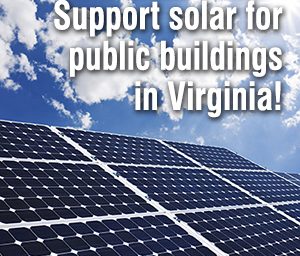Front Porch Blog

Ridgeview High School administrators hoped to begin construction on a solar array on the building’s roof, left, in December 2018, but were stopped by utility policies. Photo by Appalachian Voices staff
In Virginia, the rates that residential and commercial customers pay for electricity are approved by the State Corporation Commission. This is different from how electricity rates are set for government entities such as school or municipal buildings — for government entities located in the service areas of investor-owned utilities such as Appalachian Power, these rates are negotiated directly between the local governments and the investor-owned utilities that provide them with power.
In Southwest Virginia, the most recent contract for electric service between APCo and government entities (often referred to as non-jurisdictional customers or public authorities) expired at the end of June 2020. The utility is delaying contract negotiations for new rates and services. The old contract sets an arbitrary limit of 3 megawatts on the amount of net-metered solar energy that can be generated by local governments, and the limit has been met, meaning that no new solar projects can be built on government buildings in all of APCo’s territory. (Net-metering contracts allow building owners to be compensated for the electricity that their solar panels send to the grid.)
Additionally, the most recent contract, negotiated by APCo and the Virginia Municipal League/Virginia Association of Counties Steering Committee, blocks financing of solar energy and other distributed resources through third-party power purchase agreements (PPAs). PPAs are an important financing tool for solar, particularly for schools and local governments, because they allow customers to go solar with no money down, and they allow tax-exempt government entities to take advantage of the federal tax credit for renewable energy. That tax credit is currently 26% and will step down to 22% at the end of the calendar year. The Appalachian Voice reported on this issue nine months ago — and APCo is still slow-walking the contract negotiations, running out the clock on the 26% tax credit.
Schools and local governments in Southwest Virginia were already struggling to make ends meet before the COVID crisis hit. Now more than ever they need every opportunity to save money, and that includes the opportunity to go solar. Below we describe the many reasons why APCo and the local government steering committee must remove these arbitrary limits and the effective prohibition on solar energy, and debunk the mistruths about solar energy spread by APCo.
Net metering and PPAs benefit local communities by creating jobs and keeping energy dollars in the Commonwealth.1
- The current distributed solar industry creates nearly 5,200 jobs in Virginia, with a combined $308 million in labor income (distributed wages), and a total economic benefit of $803.3 million.
- APCo employs approximately 1,000 people in Virginia. Almost all of APCo’s generation is located out-of-state, which sends electricity funds outside of Virginia.
- A majority of distributed solar systems in Virginia are net-metered.2 PPAs account for nearly 90% of K-12 solar school installations. Limits on net metering and PPAs in the APCo contract block local solar job creation and prevent local governments from reaping the financial savings and economic and environmental benefits of clean energy.
APCo’s contractual limits on net metering are inconsistent with and more restrictive than current laws, and more restrictive than the contracts between local governments and Dominion Energy.In 2020, the General Assembly enacted legislation to expand customer access to net metering and PPAs. The law now allows for the aggregate generation from net-metered systems to reach up to 6% of an investor-owned utility’s peak load, which is currently roughly 211 MW total in APCo territory in Virginia. Government entities should benefit from these legislative changes.
- Under the current APCo contract, the 3 MW cap on net metering from local governments and public schools, also known as public authority customers, means that government buildings can only account for 1.4% of the utility’s entire 211 MW cap.
- The General Assembly expanded the PPA program intending that this financing option be available to and used by tax-exempt entities including government and school buildings that cannot otherwise take advantage of the federal tax incentives. The new laws specifically allow tax-exempt entities with solar systems up to 3 MW to use PPAs.
- APCo should eliminate the 3 MW cap on net metering for public authority customers, and public authorities should be subject to the total utility-wide net metering cap set in state law.
- Dominion’s contract allows public authorities to participate in net metering and use PPAs up to the legislative statewide caps. As a result, solar at schools in APCo territory account for only 22 kW of solar, while solar at schools in Dominion Energy and electric cooperatives’ territories accounts for 20,192 kW.

Ridgeview High School uses a small solar array on their greenhouse to teach students. Photo by Appalachian Voices staff
Solar on schools and government buildings lock in long-term, predictable energy rates at a lower rate that what APCo offers customers.
- APCo over-charged ratepayers by $7 million in 2018 according to the SCC, yet it continues to raise rates on its customers, including a new rate increase filed in March.
- Solar has the potential to decrease the total amount of taxpayer dollars spent on electricity in government-owned buildings while creating more Virginia jobs. School districts in Dominion territory are using PPAs to lock in lower long-term electricity rates and will be saving more than $4 million over 25 years.
APCo’s Green Tariff is a more costly option without local benefits
- Instead of supporting solar installations on local government buildings, APCo markets their Renewable Energy Credit (REC) purchase program or a “Green Tariff” as an alternative.
- Under APCo’s Green Tariff, customers spend more on energy, and the money goes to existing facilities outside of Virginia.
- Installing solar on-site through a PPA can actually save building owners money from day one and over the long term.
- The Green Tariff program does not spur new electricity generation, meaning that Virginia loses the key benefits of new local jobs and economic development.
APCo cannot demonstrate with data that allowing more than 3 MW of net-metered solar for local governments financed through PPAs has more costs than benefits.
- Allowing public authorities to participate in the 6% net metering cap set in state law would ensure they can participate in the net metering program without impacting utility costs.
- APCo’s claim that it must raise rates on other customers if the net metering cap is increased for public authority customers ignores the many benefits of solar and the fact that net metering systems reduce the overall costs for the utility.
- Customer-owned solar does not increase energy costs for non-solar customers at the low level of penetration that exists in Virginia. Rooftop solar has been shown to save all ratepayers (and the utility) money, while providing economic and environmental benefits for everyone.3
- New laws enacted this year require a study of the costs and benefits of net metering. After the study, the State Corporation Commission will establish an appropriate rate schedule to compensate customer generators if the study deems that changes are needed.
Standby or other punitive charges specifically targeting solar customers are not needed for APCo to adequately recover costs.
- Any standby, fixed, or demand charges levied at solar users disincentivize solar, unfairly target solar adopters and undervalue the many benefits it provides to all utility customers. Distributed solar reduces peak demand, reduces utility fuel costs, and helps defer distribution system upgrades; solar customers should not be charged more than other customers for accessing the grid.
- APCo’s claims that standby or special, targeted fixed or demand charges are needed to ensure solar customers are paying their “fair share” of grid costs need to be substantiated with full “cost of service” data. When distributed solar accounts for less than 10%, there is no data to indicate a cost shift, and most studies show the value of solar to all grid customers to be much higher than retail value.
Allowing local governments and schools to benefit from solar power would help these publicly owned entities save taxpayer money now and in the future. Southwest Virginia communities deserve the same access to solar as customers elsewhere in the state.
1Net metering is a billing mechanism that allows customers to offset their electric bill with solar generation on their premises. A PPA is a financial arrangement in which a third-party developer owns, operates, and maintains the solar system, and a host customer hosts the system on their property and purchases the electric output from the developer for a predetermined period.
2Nearly all of the 50.5 MW of distributed solar installed as of 2018 is net-metered, according to the Virginia Department of Mines Minerals and Energy.
3See e.g., Muro, Mark and Devashree Saha, Rooftop solar: Net metering is a net benefit. Brookings Institute. May 23, 2016.
and Solar Energy in Michigan: The Economic Impact of Distributed Generation on Non-Solar Customers, Institute for Energy Innovation. June 2017. Why Rooftop Solar is Not a Cost-Shift, Solar United Neighbors
PREVIOUS
NEXT

Leave a comment
Your email address will not be published. Required fields are marked *


Leave a Comment